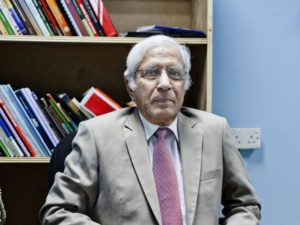To what extent is the tax-reform package a political ploy?
By Newsline Admin | Economy | Published 7 years ago
Babar Ayaz is an author and freelance journalist.
 The PML-N government appears to be in hot water, both politically and economically. The economic initiatives it has taken have not been effective. It has failed to resolve the loadshedding issue, which it promised to overcome by 2018. Apparently, it is also failing to keep its promise of not turning to the IMF to bail Pakistan out of a current account deficit.
The PML-N government appears to be in hot water, both politically and economically. The economic initiatives it has taken have not been effective. It has failed to resolve the loadshedding issue, which it promised to overcome by 2018. Apparently, it is also failing to keep its promise of not turning to the IMF to bail Pakistan out of a current account deficit.
More recently, the government announced a tax amnesty scheme. But it came too late — in the twilight of its tenure. The fate of this scheme, too, is in the doldrums. It was introduced through presidential ordinances on April 9, while the National Assembly and the Senate were in session.
The democratic and constitutional norm is that when Parliament is in session, ordinances are not issued. Instead, the government or opposition members move bills. The PML-N government, after having waited till the fag-end of its tenure, and debating the amnesty scheme for over a year, was in a hurry to get it passed. The advantage of moving the bill through parliament is that the bipartisan parliamentary committee debates the law before moving it, for approval, to the National Assembly.
Opposition parties that have a majority in the Upper House, have already raised the issue in the Senate. So even if the government tries to steamroll the tax amnesty law through the lower house by using its majority, it is likely to be opposed by the majority in the Senate.
The government presented the scheme as a part of the Finance Bill in the 2018-2019 Budget. The Opposition has challenged its right to present the budget for the entire year. It has proposed that the government should present the budget for the interim four-month period only. If the PML-N fails to form the next government, it should not burden the future government with its budgetary commitments, which may come in late July or early August, if all goes according to schedule. In any case, the Opposition does not support the tax amnesty scheme.
There will be little confidence in the scheme among those who are being called to declare their local and foreign assets. They would not have confidence in the ordinances that lapse after 120 days. However, there have been many instances in which lapsed ordinances are renewed until the parliament turns them into Acts.
The Supreme Court — with which the government has an adversarial relationship — has already said that it will review the scheme. It is unlikely that this will lead to any favourable outcomes for the government. But the fact that the Supreme Court is consulting the same set of experts who advised the government during the framing of the scheme, does create a margin of hope. If the scheme gets the approval of the Supreme Court, it will have a legal cover and may be trusted by those who are being called on to declare their assets.
Critics of the amnesty package, who see it as a political ploy, are forgetting that The Foreign Assets Declaration Repatriation (FADR) is a timely move on the part of the government. Apprehensions that it would become a permanent channel of money laundering for corrupt politicians and the bureaucracy are also misplaced. The scheme offers a one-time only amnesty for the declaration of local and foreign assets. At the same time, it bars all government and public office-holders from availing the tax amnesty under this scheme.

Under an initiative of the Organisation for Economic Cooperation and Development (OECD), 104 countries have signed an agreement — the Standard for Automatic Exchange of Financial Information in Tax Matters — to share the banking information of their citizens. They have made it mandatory for depositors from foreign countries to share their national tax numbers (NTN) with banks.
This was done to curb tax avoidance and evasion in the countries that are signatories to this agreement. However, it is not clear whether inter-government information-sharing will be done only upon request, or otherwise. It is also unclear from the documents whether the information would be shared only in cases where the aggregate deposit is over USD $250,000.
The government’s amnesty offer is that if people bring their foreign currency deposits into the country, they will have to pay 2 per cent tax. However, if they prefer to maintain their account abroad, they will have to declare their total assets and give 5 per cent tax to whiten these assets.
Those who have been maintaining foreign currency accounts abroad have been done a favour by the government. The new banking laws and the OECD agreement have made it difficult for them to maintain their accounts in other countries — especially after Pakistan was been put on the grey list by the FATF (Financial Action Task Force) regime.
Some tax experts are of the view that once people who have accounts abroad are comfortable with the legal cover, they might transfer money back to their home country. But the realistic estimate is that it might get Pakistan an inflow of around $2 billion to $5 billion — a much-needed sum in the face of the current account deficit. Whatever the fate of this scheme might be, the fruits of amnesty will be harvested by the next government.
One of the biggest factors here would be to trust the government and, more so, the FBR officials who have gained the reputation of becoming ‘official’ extortionists.
Foreign currency account holders, similarly, have the facility of the 1992 Act, which was also introduced by Nawaz Sharif, to transfer money from such accounts abroad, provided the amount is less than USD $10,000.
Pakistani citizens are already allowed to maintain foreign currency accounts, with no questions asked by the FBR. This has helped Pakistanis to hold around USD $6 billion in local banks. If everyone who holds a foreign currency account in Pakistan were to avail this amnesty, the government would be able to bag $120 million (approximately Rs. 13.8 billion).
Foreign currency account holders can whiten this money by surrendering their dollars to the bank and getting a certificate from them. In this case, their loss is usually the difference between the open-market rates of the US dollar, or any other foreign currency, which are usually 1 per cent to 2 per cent higher than the rates offered by the bank.
The offer that people can whiten their foreign currency account’s assets held in the country by paying two per cent tax, is not very different from the existing policy regarding foreign currency accounts. The State Bank has already said that, for the purpose of calculating tax on foreign currency accounts the official equivalent rate would be admissible.
Financial sector experts believe that much of the Pakistani assets abroad are in real estate, which may not be declared by their owners. If they do declare, they can whiten these assets by paying tax at the rate of 3 per cent.
However, the law to curb under-invoicing of real estate purchases within the country, appears to be a good move as now the government will have the right to buy off properties with misdeclared values. A similar law has been very successful in India.
Such amnesties used to be referred to as “premium on dishonesty” by the late Ghulam Ishaq Khan. The critics of the schemes should bear in mind that over 25 countries have tried this course — and, in some cases, more than once. In Pakistan, too, it is the tenth time since 1958 that amnesty has been offered to net assets that have escaped the tax net.
Kalam Naqvi is a journalist based in Pakistan.
Amnesty has become a bad word. Politicians may like it, but the idea has few takers among ordinary voters.
Three of the four ordinances in the Economic Reform Package (ERP) are about undeclared assets and foreign currency accounts. This means three-quarters of the ERP cannot possibly be about winning the elections. Rich people don’t vote in enough numbers to leave a material impact on poll outcomes.
This leaves us with the amendments to the Income Tax Ordinance 2001, which drastically slashed the tax rates for individuals.
Whether the move constitutes a political ploy depends on three questions.
1. Does it benefit a large segment of the population?
2. What will be its impact on tax collection?
3. How will it affect the drive to document the economy?
The answer to the first question is a resounding yes. According to BR Research (the research wing of the Business Recorder), almost half of the existing tax-filers will be exempt from income tax.
The three-fold increase in the lower limit of the monthly taxable income to Rs100,000 will augment the disposable income of a large number of non-filing salaried people, whose tax gets deducted at source.
Taxes contributed by individual filers were less than 6 per cent of direct tax collection in 2014-15. Similarly, people who are now exempt from income tax had a share of only 4 per cent in direct collection. So the number of such taxpayers may run into millions, but their contribution accounts for only a fraction of the total collection.
As per the calculation by economists Shahid Kardar and Hafiz Pasha, the revenue loss will be around Rs80 billion. It’s a relatively low number and can potentially be covered by economic gains generated by increased disposable income of a large number of people.
Rate cuts will not hit the documentation drive as the filing of returns remains mandatory. In fact, a larger number of salaried people will likely file zero-tax returns to avoid withholding taxes on sundry transactions.
Corporate tax rates are already high. According to the Overseas Investors Chamber of Commerce and Industry, Pakistan is the second most heavily taxed country as the overall tax rate for the corporate sector has gone up to 47 per cent.
The government milks the corporate sector of a fortune just because it happens to be already in the tax net. It taxes the companies, their employees, and the consumers of their products and services simultaneously.
Yet vast segments of the economy — like agriculture and wholesale and retail trade that constitute 38 per cent of the GDP (Gross Domestic Product) — remain largely tax free.
Cutting taxes is a populist move. But if righting a wrong is a ploy by the PML-N to get middle-class votes, then so be it. It’s always better late than never.
M. Ziauddin is the former Executive Editor of The Express Tribune, and presently a freelance columnist.
 The very timing of the announcement of the tax reform package, and that too through a Presidential Ordinance, makes it more of a political ploy than an economic measure. It seems like a transparent attempt to win over the support of the salaried classes, as well as the corporate sector in the forthcoming elections.
The very timing of the announcement of the tax reform package, and that too through a Presidential Ordinance, makes it more of a political ploy than an economic measure. It seems like a transparent attempt to win over the support of the salaried classes, as well as the corporate sector in the forthcoming elections.
The government has estimated that the tax concessions would cost the exchequer as much as Rs. 90 billion, during the next fiscal year. But according to the Prime Minister’s Advisor on Finance, Miftah Ismail, the additional Rs. 90 billion savings, which would accrue to the tax paying public as a result of the proposed fiscal measure, would trigger increased economic activity. It will enhance demand which, in turn, would cause the manufacturing wheels to move at a faster rate, resulting in additional income for the government in terms of revenues.
However, the government’s expectation that a reduction in the rates of top tax slabs would encourage the rich to pay their legitimate tax dues honestly, may be be wishful thinking.
Nobody anywhere in the world pays his/her tax dues willingly. Most do it to avoid the consequences of not paying. In Pakistan, to date, not a single person has had to undergo punishment for not paying taxes. In most cases, when caught, they have gone to the courts and obtained stay orders.
The related amnesty scheme appears to have been announced mostly in the hope of documenting undeclared local and foreign money and other assets, as well as earning additional revenues, no matter how small.
Its timing is also significant. Since the Panama Papers, unexplained bank and physical assets anywhere in the world, are being investigated by respective governments. It is hoped, therefore, that those who had stashed their illegitimate wealth in foreign countries would use the measure to legitimise these assets.
The measure relating to real estate buying and selling, is clearly an attempt to plug a popular avenue being used to hide tainted money and evade legitimate taxes.
Asad Umar is an MNA from Pakistan Tehreek-e-Insaf and former CEO Engro Corp.
 There are three main components of the tax reform package announced by the prime minister. The first relates to reducing the rate of tax on individuals and raising the exemption limit. We support this measure, as the burden of tax has been disproportionately placed on those who are tax-filers and any relief to them is a welcome measure.
There are three main components of the tax reform package announced by the prime minister. The first relates to reducing the rate of tax on individuals and raising the exemption limit. We support this measure, as the burden of tax has been disproportionately placed on those who are tax-filers and any relief to them is a welcome measure.
The second component relates to real estate valuation and is generally sound, though there are a number of procedural and legal issues which need clarification .
The third relates to the provision of amnesty to those who have undeclared wealth. We strongly oppose this measure, which is essentially a tax on honesty and a reward for dishonesty.
This is the fourth amnesty scheme in the last five years. All the previous ones have failed miserably to meet the stated objectives of increasing government revenues and expanding the tax net. In fact, the number of tax filers was just above two million in the year 2007, and a decade later, has reduced to just one million despite all these schemes. The reason for this is not difficult to fathom. This is the consequence of what is referred to as a ‘moral hazard.’
By introducing schemes repeatedly, the government has announced to the citizens that it is powerless in front of the dishonest and the corrupt. Through the schemes, it is begging the dishonest to voluntarily declare their hidden wealth, pay a pittance as tax, and be absolved from any punishment. When everyone can see this happening again and again why would anyone choose to pay high rates of tax and subject themselves to tax audits and harassment?
The world is making moves to tightening the screws around those who hide illegitimate wealth. It is time for Pakistan to be a part of this global movement and not provide incentives to the dishonest. Until the criminals of Pakistan are taught the lesson that crime does not pay, we will continue to see them flourish in every segment of society .


